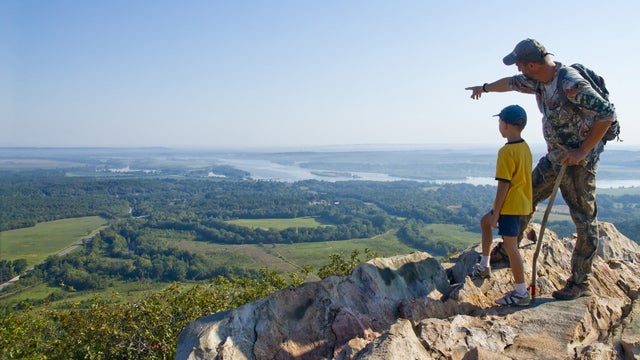THERE ARE A NUMBER of important goals you should try to accomplish in the outdoors between the ages of zero and 20. You can’t start too early, but I’ll assume you will not actually do much on your own initiative until you are about seven years old.
If you are seven, and read this, I’m happy to have you for a reader. Most readers of this magazine are older, but when I was seven, I read outdoor magazines all the time. My grandfather gave me a subscription to , a magazine about hunting and fishing, and each month I knew the day on which it was likely to arrive, and I looked forward to finding it in our mailbox at the end of our muddy driveway.
When you are of elementary-school age, you should do everything in the outdoors that you want to do and that grown-ups will allow. In my case, I wanted to hunt and fish. My parents allowed fishing but not hunting with guns. Even without guns, I hunted anyway, mostly using slingshots that I made myself. I caused little harm, but I did get to know the woods and swamps around our house in Ohio, and the desert around my grandparents’ house in Arizona. Being out in those great places was more valuable than hunting.
Think, first: what do you want to do? There are all kinds of things to do outdoors. Whatever you decide on, think about it a lot, and imagine the coolest parts of it, and imagine yourself doing them, and try to do them. I fished every chance I got, but I thought about many more kinds of fishing than I was able to do in Ohio. I imagined catching big trout in clear, rushing streams with snow-covered mountains in the background. The outdoors may seem at first like the world you already know—like a highway or a car wash, say—but it is in fact fantastical. That is, it’s more like the fantasy place you imagine in your head than it’s like ordinary man-made reality. The better acquainted you are with the fantasy outdoors, the better you will eventually understand and appreciate the actual outdoors.
Never stop bugging your parents, or other adults, to let you do what you want. You will not always succeed, of course. I gave up on guns, but that only made me bug my parents more about fishing. Anytime we went on a trip, I looked up the good fishing spots in the area and asked them to take me to them. Whatever you want to do—snowboarding, dirt-bike riding, horses—find out the details of where to go and how to do it, and then present your argument to whatever family members or other adults can help. Also, go to stores that sell outdoor stuff—whatever kind of stuff you discover that you are into. I’m not saying you should agitate for people to buy you stuff. I mean you should go through outdoor stores on a regular basis and check out what they have; catalogs, too. Seeing the latest outdoor gear is a huge amount of fun, and when the time comes to buy the few things you will actually need, you’ll be well informed.
Time passes slowly when you’re young, but after a long while you’ll be able to venture to farther places. As soon as you can, buy a car. Enjoying the outdoors almost always involves going somewhere not near to where you happen to be. Ride a bike to the place you’re seeking, if that’s practical. One way or another—go. I regret I did not see more country when I was young. It’s all changing constantly. There are good places that will be ruined in three years, and you should see them while you can. And spend at least some time in them by yourself. By the time you are 20, you should have spent at least a night or two outdoors alone.
Finally, remember your adventures. Write them down in a diary if you can. ���ϳԹ���s when you’re young are the most vivid of your life, and what you do in the future will be based on them.
Ian Frazier is the author of .


